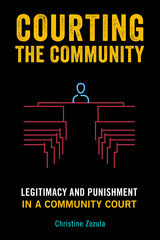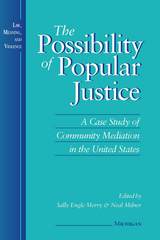
Community Courts are designed to handle a city’s low-level offenses and quality-of-life crimes, such as littering, loitering, or public drunkenness. Court advocates maintain that these largely victimless crimes jeopardize the well-being of residents, businesses, and visitors. Whereas traditional courts might dismiss such cases or administer a small fine, community courts aim to meaningfully punish offenders to avoid disorder escalating to apocalyptic decline.
Courting the Community is a fascinating ethnography that goes behind the scenes to explore how quality-of-life discourses are translated into court practices that marry therapeutic and rehabilitative ideas. Christine Zozula shows how residents and businesses participate in meting out justice—such as through community service, treatment, or other sanctions—making it more emotional, less detached, and more legitimate in the eyes of stakeholders. She also examines both “impact panels,” in which offenders, residents, and business owners meet to discuss how quality-of-life crimes negatively impact the neighborhood, as well as strategic neighborhood outreach efforts to update residents on cases and gauge their concerns.
Zozula’s nuanced investigation of community courts can lead us to a deeper understanding of punishment and rehabilitation and, by extension, the current state of the American court system.

"These immensely important articles--fifteen in all--take several academic perspectives on the [San Francisco Community Boards] program's diverse history, impact, and implications for 'popular justice.' These articles will richly inform the program, polemical, and political perspectives of anyone working on 'alternative programs' of any sort." -- IARCA Journal
"Few collections are so well integrated, analytically penetrating, or as readable as this fascinating account. It is a 'must read' for anyone interested in community mediation." --William M. O'Barr, Duke University
"You do not have to be involved in mediation to appreciate this book. The authors use the case as a launching pad to evaluate the possibilities and 'impossibilities' of building community in complex urban areas and pursuing popular justice in the shadow of state law." --Deborah M. Kolb, Harvard Law School and Simmons College
Sally Engle Merry is Professor of Anthropology, Wellesley College. Neal Milner is Professor of Political Science and Director of the Program on Conflict Resolution, University of Hawaii.
READERS
Browse our collection.
PUBLISHERS
See BiblioVault's publisher services.
STUDENT SERVICES
Files for college accessibility offices.
UChicago Accessibility Resources
home | accessibility | search | about | contact us
BiblioVault ® 2001 - 2024
The University of Chicago Press









